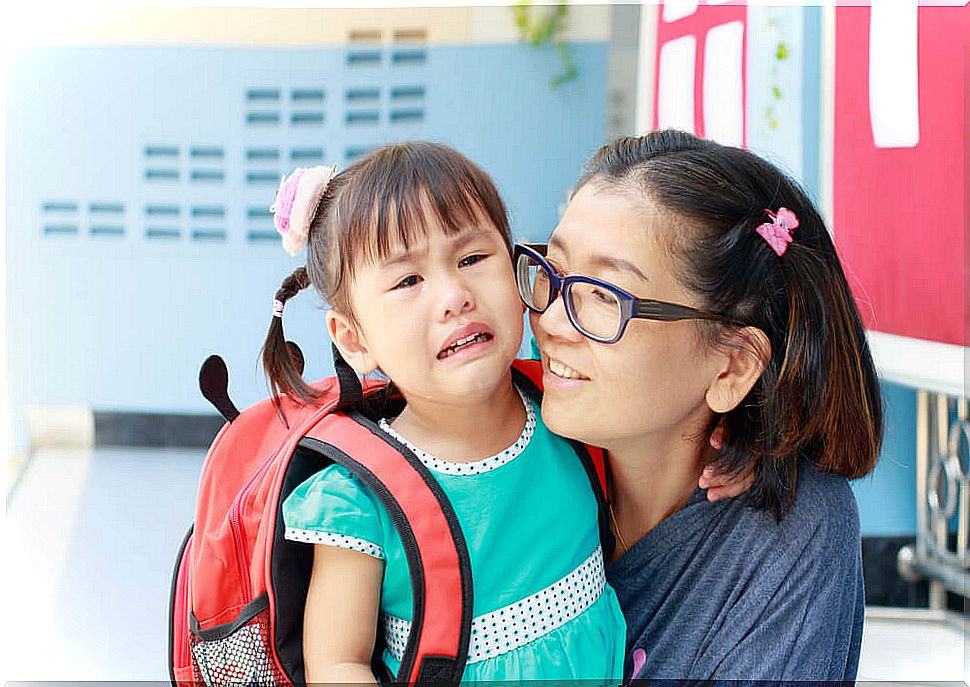Helping A Child Adjust To A New School
Adjusting to a new school is a time of great anxiety and fear for most children, regardless of their age. In fact, the adaptation period usually lasts a couple of months, until the little one feels really comfortable with his teacher and classmates.
As parents, it is our duty to help our children overcome that anxiety, look at the half-full glass and discover all the good about the new experience. Don’t miss our tips.
Why do fears and anxiety appear?

Regardless of the age of your child, the appearance of anxiety and different fears is usually a fact when we talk about a change of this magnitude. It is not difficult to understand what happens to minors; it is only necessary to exercise empathy.
A new school implies a new beginning for the little ones (and not so little ones). Among the main factors that produce fear and anxiety we find the following:
- The unknown : everything is new and the child does not know how things work or what he will find.
- Not having friends : a new school means entering a course in which everyone knows each other. The boy enters an armed group where he does not have a friend. It is logical that this situation generates fears.
- Losing friends : Another common fear is to believe that friends from the old school will be lost, that they will forget about him and that he will never see them again.
Remember that the adjustment period varies from one child to another based on their age (young children tend to adapt faster than older children) and their personality (shy children usually need more time to adjust). Be patient and accompany your child.
As evidenced by this study published in Innovation and educational experiences , the adaptation period is essential to guarantee the stability and balance of the little ones.
How to help the child adjust to a new school?
While moving to a new school is likely to create some anxiety for you as well, you should keep it under control. Do not forget that parents are the mirror in which children look. We are your example to follow. Let’s now look at some good tips to help your child adjust to his new school.
Before the change of school

- Announce change only when it is a fact : talking about possibilities with your children will only create stress for them. Let them know that they will go to a new school only when you are sure that will happen.
- Explain the reasons : Talking with your children about the reasons that drive change is the only way for them to understand the need for it. Although they are small, they have reasoning ability. Be patient to receive their questions and have a dialogue.
- Provide important information : tell them when they will start the new school, how their days will be organized, how school works and everything you consider necessary to minimize your children’s anxiety.
- Be empathetic : This is a difficult time for your children. Put yourself in their shoes and don’t lose your cool. Your children need your understanding, your love, and your support.
- Visit the school : knowing the new school before the start of classes (or the moment of change) can be decisive for your children to get used to the idea. Ask at the school if it is possible to visit it. This information from Kids Health indicates that it is good to know the physical location of the most relevant places in the center, such as the secretary’s office, the gym or the auditorium.
- Take advantage of extracurricular activities : If the school offers activities outside of class time, it may be a good idea to enroll your child in one of them. Pick an activity that he enjoys and slowly let him get used to the new school and his new classmates. This way, when the time comes, you won’t feel as much like “the new one.”
The first day of school to adjust to the new school

- Wake up your child with love : take the opportunity to have breakfast with him without haste and try to calm his anxiety.
- Go with him to the new school : it doesn’t matter how old he is; he will need your support to face his new teachers and classmates. Be their pillar!
- Listen to him : make him feel that you understand his fears and insecurities. Listen to your son, let him vent to you.
- Be punctual : both when you drop him off and when you pick him up. It is important that your child arrives on time in the morning and it is essential that he finds you waiting for him when he leaves school.
- If your child cries (in the case of the little ones), assure him that everything will be fine, but do not go home with him.
- Pay attention to the signs : some children do not share everything that happened at school or have trouble expressing their feelings. Observe him and try to detect if he presents changes in personality or attitudes to know how he is living the change.
During the adaptation period

- Do not forget that we are talking about an adaptation period : it is impossible to say how long your child will need to feel comfortable in the new school. Take a deep breath and remember that each person needs a different amount of time.
- Never lose your patience if your child says he doesn’t want to go to school – adjusting can be very difficult. Listen to your son and accompany him, do not add stress to his life with recriminations or yelling.
- Contact other parents in the course : find out which child your child likes and talk to their parents. Maybe you can invite him to your house to play or eat, so you can help your child break the ice.
- Listen more than you talk : allow your children to express themselves, try to understand them, and do not discourage yourself. Each person experiences the process of change differently.
In short, adapting to a new school can be a long and complex period, depending on the characteristics of each child. Arm yourself with patience and empathy! Only then can you help your children.








